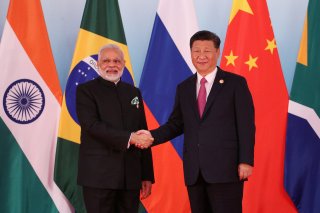An India-China Reset Is a Long Way Off
India has made it clear that normalization can only take place if China accommodates its interests.
As Chinese leader Xi Jinping has secured the unprecedented third term, Beijing’s focus will now be on mending ties and reaching out to friendly countries, at least in the near future. Given that China has witnessed unprecedented protests in response to its zero-Covid policy, it may also stay low-key with its external engagements and avoid diplomatic disputes.
Xi’s meetings with President Joe Biden and Australian prime minister Anthony Albanese on the sidelines of the G20 summit in November can be seen in that context. While such meetings cannot be categorized as resets, Beijing appears to be attempting to move toward the resumption of dialogue and partial normalization. However, India does not seem to be on China’s list. It is unlikely that China will opt for sustainable and lasting cooperation with India.
Indian prime minister Narendra Modi and Xi have not held a bilateral meeting since the onset of the Covid-19 pandemic. They came face-to-face on the sidelines of the Shanghai Cooperation Organization (SCO) and the G20’s recent summits, but the two leaders did not sit down to work through their differences. It has been made clear that any reset in India-China relations will now be on India’s terms.
China’s incursions in the Galwan Valley caught India off guard, as they happened just after two informal summits in China and India in 2018 and 2019, respectively. The proposal to hold informal summits came from China in the aftermath of the revival of the Quad, the security dialogue between Australia, India, Japan, and the United States. Even though the Quad was elevated to the leadership level only in 2020, the 2017 Doklam border standoff between Beijing and New Delhi had already led to a deterioration in India-China relations.
The days are gone when India overlooked China’s overtures on the border. One important condition for normalization would be China showing a genuine effort to diffuse tensions on the border. What changed India’s outlook on China is the realization that the more than seven-decade-old border dispute is no longer about differing perceptions of the Line of Actual Control (LAC) and is merely an attempt by the Chinese side to keep India preoccupied.
Indian officials are working to convey India’s concerns and advance its interests. They are no longer shying away from acknowledging that China is a threat to India’s national security. While the border standoffs have been a regular feature of India-China relations since at least 1986, the Modi administration believes that no normalization can take place without genuine attempts to diffuse tensions at the border.
India’s foreign outreach under the Modi administration has been noteworthy. Some of the examples include the 2016 outreach summit between the Bay of Bengal Initiative for Multi-Sectoral Technical and Economic Cooperation (BIMSTEC) and the BRICS forum, the invitation of ten Association of Southeast Asian Nations (ASEAN) leaders as the chief guests for India’s Republic Day parade, India’s active participation in the Quad, and informal summits with Xi. Over the years, India has tried to have stable and manageable ties with China. Even after the violent Galwan incursions, India did not suspend dialogue with China, which continued at the diplomatic-military level.
There is a mismatch between the approaches of India and China. While India wants a solution to the long-standing issues, China argues that India should put the border dispute on the backburner. Moreover, the current Indian administration has been tough on China, and Modi’s hard-handed approach to China in the aftermath of the Galwan clashes earned him accolades at home. It will be difficult to sell a reset with China domestically. Any friendly move towards China without concessions from Beijing does not seem to be an option, at least for now.
But is China keen on resetting ties with India? The answer seems to be no. China has adopted a combative approach while dealing with India and left little room for concessions. There are a number of reasons for this posture. First, China perceives the Indo-Pacific as a theater for the United States’ strategy of containing China, and India is an important part of that strategy. China is opposed to the idea of India playing a bigger role in the Indo-Pacific and is unwilling to treat it as an equal partner. Second, China’s traditional way of dealing with India has worked and is highly unlikely to change. The presentation of a two-front threat—keeping the border dispute alive and assisting Pakistan against India—has helped China contain India. Third, India is increasingly viewed favorably by its Indo-Pacific partners. With the emergence of the Indo-Pacific construct, India now has the regional position that China has long aspired to achieve. India’s rising profile and potential to counterbalance China in the region is a consequential challenge for China.
If China wishes to resolve its differences with India, it should detach India’s position vis-à-vis the United States and the West from its changing outlook on China. India-China relations are deteriorating because of Beijing’s consistent efforts to contain New Delhi.
As India is beginning its G20 presidency and hosting the SCO summit next year, it is less likely to extend an olive branch to China. Normalization does not hinge on Xi’s participation in the summits or his potential visit to India next year. Indeed, the Indian side has made it clear that normalization can only take place if China accommodates its interests. So far, there are no signs of that happening.
Sana Hashmi is Postdoctoral fellow at Taiwan-Asia Exchange Foundation. She is an affiliated scholar with the Research Institute for Indo-Pacific Affairs (RIIPA). She was Taiwan’s Ministry of Foreign Affairs Fellow at the Institute of International Relations, National Chengchi University in 202, and is a former Consultant in the Ministry of External Affairs (MEA), Government of India.
Image: Reuters.

